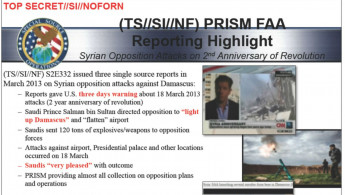Saudi prince ordered Syrian rebels to attack Assad's palace in Damascus, 'leaked' US document alleges
The document, which was published by online news website The Intercept on Tuesday, suggests that Prince Salman bin Sultan ordered rebels to "light up Damascus" on the second anniversary of the civil war.
The royal, who at the time was a senior official in the kingdom's National Security Council, allegedly commanded Saudi-funded opposition groups to fire rockets deep into the Syrian capital, according to the document which purports to be a National Security Agency report provided by whistleblower Edward Snowden.
"Saudi Prince Salman bin Sultan directed opposition to 'light up Damascus' and 'flatten' airport," the document says.
"Saudis sent 120 tons of explosives/weapons to opposition forces. Saudis 'very pleased' with outcome," it adds.
According to media reports from the time, the attacks on March 18, 2013, struck the presidential palace, Damascus International Airport, and a government security compound.
The Free Syrian Army published videos of the attack online.
Saudi Arabia is one of several regional and global powers which have long provided military and financial support to rebels fighting Assad.
See Also: Saudi Arabia's ultimate betrayal of the Syrian revolution
In August, Riyadh rejected media reports that it had "gone soft" on Assad, and said it still insisted there could be no role for the Syrian president during a future transition phase.
The Syrian conflict began when the Baath regime, in power since 1963 and led by Assad, responded with military force to peaceful protests demanding democratic reforms during the Arab Spring wave of uprisings.
It triggered an armed rebellion fuelled by mass defections from the Syrian army.
According to independent monitors, hundreds of thousands of civilians have been killed in the war, mostly by the regime and its powerful allies. Millions more have been displaced both inside and outside of Syria.
The brutal tactics pursued mainly by the regime, which have included the use of chemical weapons, sieges, mass executions and torture against civilians have led to war crimes investigations.





 Follow the Middle East's top stories in English at The New Arab on Google News
Follow the Middle East's top stories in English at The New Arab on Google News
![Israeli forces ordered bombed Gaza's Jabalia, ordering residents to leave [Getty]](/sites/default/files/styles/image_330x185/public/2176418030.jpeg?h=a5f2f23a&itok=_YGZaP1z)

